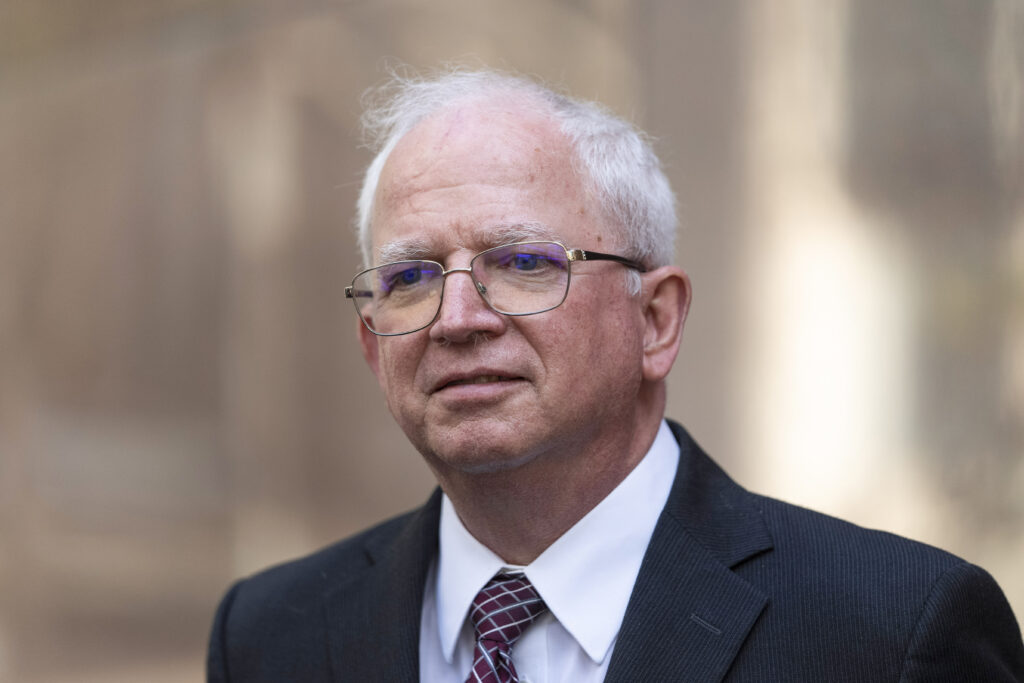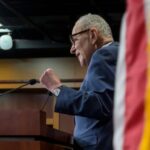
A California judge ruled that former President Donald Trump’s lawyer John Eastman should be disbarred for an alleged attempt to subvert the 2020 election results.
State Bar Court of California Judge Yvette Roland announced her ruling Wednesday. The former Trump lawyer was accused of 11 disciplinary charges in California’s bar court, ten of which the judge found he was culpable for violating.

“In view of the circumstances surrounding Eastman’s misconduct and balancing the aggravation and mitigation, the court recommends that Eastman be disbarred,” Roland wrote in her decision. The recommendation will now go to the California Supreme Court for a final ruling.
Roland’s ruling marks a defeat for Eastman, though she did side with him on one of his 11 counts.
The state bar accused Eastman of moral turpitude over a speech he gave on Jan. 6 at the Ellipse outside the White House, tying it to the riot later in the day, but the judge dismissed the count after holding the bar “presented no evidence to show that Eastman’s statements contributed to the assault on the Capitol.”
Eastman said in the coming days and weeks, he would begin “highlighting the evidence that demonstrates the contrary of the findings of misrepresentation made by the Court, and also the aspects of the ‘trial’ that were simply beyond belief,” according to a Substack post.
In early November, Roland found Eastman culpable for multiple ethics violations, a tentative ruling that gave the Office of Chief Trial Counsel more time to consider further evidence that could have strengthened their argument for a harsher punishment.
Eastman, a former Chapman University law school dean, faced 11 counts of ethical and legal violations for his post-2020 election activities ahead of the Jan. 6 Capitol attack. He and Trump, along with 17 others, were also charged in Georgia over an alleged plot to overturn the election results in August last year.
The lawyer and constitutional law professor defended himself against the ethical violations by saying he was advising then-President Trump as a client, advice that included suggesting to then-Vice President Mike Pence that the electoral count be suspended so state legislatures could investigate alleged illegalities or election irregularities, concerns he said were “well-grounded in fact and anything but frivolous.” No evidence of election interference on a large scale has been found.
Eastman’s trial in California began in June and continued intermittently until early November.
An initial complaint was filed in October 2021 by the group States United Democracy Center, a left-leaning election law organization founded by Obama-era White House “Ethics Czar” Norm Eisen, and the state bar brought its case in early 2023.
Christine P. Sun, States United’s senior vice president of legal, previously said Roland’s preliminary findings in November revealed “Eastman had no legal or factual basis for his plan to help Donald Trump steal the 2020 presidential election,” according to a statement from Nov. 2.
The trial featured several witnesses from both sides, including a former Wisconsin Supreme Court justice who testified on Eastman’s behalf, along with former Justice Department attorney John Yoo and U.S. Court of Appeals Judge Janice Rogers Brown. The state bar called on a former chief counsel to then-Vice President Pence, among other witnesses.
In the Georgia case, prosecutors have charged Eastman with eight counts, including racketeering and solicitation of violation of oath by a public officer. He has pleaded not guilty.
Eastman, who is also licensed to practice law in Washington, D.C., told the Washington Examiner he plans to appeal the decision to the California Supreme Court and even take the matter to the U.S. Supreme Court.
The process of appealing the recommendation includes making an appeal to a review court for the California State Bar, which will then decide whether to send the appeal to the state Supreme Court.
Eastman said he would be filing his appeal in the coming days.
CLICK HERE TO READ MORE FROM THE WASHINGTON EXAMINER
“We will appeal the decision, of course, and hopefully the California Bar Review Court, the California Supreme Court, or the U.S. Supreme Court will step in to put a stop to this ‘lawfare’ that has become a serious threat to the First Amendment, the right of controversial clients and causes to legal representation, and more broadly to our adversarial system of justice,” Eastman wrote in his Substack post.
The attorney added that he would also file a stay of the judge’s recommendation to suspend his license in a bid to maintain his ability to practice law in the state while the state Supreme Court contemplates whether to accept the judge’s recommendation.




